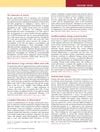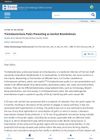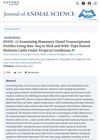2 citations,
December 2023 in “International journal of molecular sciences” Wound healing is greatly affected by the types of bacteria present, which can either help or hinder the process.
 January 2023 in “Fundamental toxicological sciences”
January 2023 in “Fundamental toxicological sciences” Mozuku seaweed fucoidan can inhibit harmful skin bacteria growth.
 57 citations,
March 2019 in “Immunity”
57 citations,
March 2019 in “Immunity” The document concludes that the skin's immune system is complex, involving interactions with hair follicles, nerves, and microbes, and can protect or cause disease, offering targets for new treatments.
2 citations,
February 2024 in “International journal of molecular sciences” Gut health affects skin diseases, and probiotics might help.
2 citations,
December 2007 in “Microbial pathogenesis” Anthrax bacteria can infect and destroy hair follicles in mice, but the immune system eventually clears the infection.
2 citations,
January 2018 in “Elsevier eBooks” Probiotics and dietary changes can help treat acne.
 August 2017 in “Journal of Investigative Dermatology”
August 2017 in “Journal of Investigative Dermatology” Activin increases skin tumor formation, skin Tregs help hair growth, lymph-node removal doesn't improve melanoma survival, cells can revert to stem cells in wound healing, and skin bacteria produce peptides that may treat infections.
1 citations,
August 2019 in “Chinese Medical Journal” A man developed facial skin lesions after a stem cell transplant, which improved with specific treatments.
 8 citations,
September 2016 in “Asian journal of beauty & cosmetology”
8 citations,
September 2016 in “Asian journal of beauty & cosmetology” Dendropanax morbifera leaf extract could be good for hair growth and cosmetic products because of its antioxidant properties and growth factor effects.
 1 citations,
May 2021 in “Cell Host & Microbe”
1 citations,
May 2021 in “Cell Host & Microbe” Skin bacteria, specifically Streptococcus and Staphylococcus, help in hair regrowth after skin injury and speed up wound healing.
 September 2020 in “Journal of Investigative Medicine”
September 2020 in “Journal of Investigative Medicine” Omics techniques are needed to understand the scalp microbiome's role in alopecia areata for new treatments.
4 citations,
October 2021 in “Microorganisms” Men with androgenetic alopecia have different scalp oils and microbes compared to those without.
13 citations,
November 2017 in “BMC Veterinary Research” Fusidic acid can be an effective topical treatment for superficial bacterial infections in dogs.
 August 2023 in “Clinical, Cosmetic and Investigational Dermatology”
August 2023 in “Clinical, Cosmetic and Investigational Dermatology” Research on the human skin microbiome has grown, focusing on skin health and diseases, with more studies needed on antibiotic resistance and AI applications.
 2 citations,
May 2022 in “Cosmetics”
2 citations,
May 2022 in “Cosmetics” Further research is needed to understand how the microbiome affects hair loss in Alopecia Areata.
5 citations,
September 2022 in “Frontiers in Nutrition” Gut bacteria differences may help diagnose and treat Alopecia areata.
 7 citations,
February 2006 in “Clinical and Experimental Dermatology”
7 citations,
February 2006 in “Clinical and Experimental Dermatology” Using anabolic steroids 'Sus' and 'Deca' for bodybuilding caused severe acne in a man.
 July 2023 in “Research Square (Research Square)”
July 2023 in “Research Square (Research Square)” Certain gut bacteria may protect against alopecia areata, while others may increase the risk.
 6 citations,
September 2014 in “Australasian Journal of Dermatology”
6 citations,
September 2014 in “Australasian Journal of Dermatology” Asylum seekers arriving by boat may face skin problems due to harsh conditions, and doctors should use a thorough skin assessment approach to diagnose and treat them effectively.
 6 citations,
April 2023 in “Frontiers in plant science”
6 citations,
April 2023 in “Frontiers in plant science” Certain bacteria can boost lentil growth and improve soil used for farming.
 127 citations,
January 2013 in “PLOS ONE”
127 citations,
January 2013 in “PLOS ONE” Probiotic bacteria improved skin and hair health in aged mice.
 1 citations,
September 2017 in “Frontiers in Laboratory Medicine”
1 citations,
September 2017 in “Frontiers in Laboratory Medicine” Gut flora changes could potentially indicate depression, but more research is needed.
March 1993 in “Neuroscience letters” Biotin is important for metabolism, with specific daily intake recommendations, and deficiency can cause health problems.
15 citations,
October 1999 in “International Journal of Dermatology” Sleeping on a waterbed caused a skin infection, which cleared up with clindamycin gel.
1 citations,
September 2014 in “Neuro-Oncology” Shiunko ointment may help prevent scalp dermatitis during radiotherapy but doesn't stop hair loss.
 December 2024 in “Medicine”
December 2024 in “Medicine” Gut bacteria may affect hair loss risk.
 November 2022 in “Journal of Education, Health and Sport”
November 2022 in “Journal of Education, Health and Sport” The skin's bacteria might influence the development of a hair loss condition called alopecia areata.
 May 2024 in “Indian Dermatology Online Journal”
May 2024 in “Indian Dermatology Online Journal” A rare bacterial infection of pubic hair can cause strong genital odor, but trimming hair and using clindamycin can quickly fix it.
 November 2023 in “Journal of animal science/Journal of animal science ... and ASAS reference compendium”
November 2023 in “Journal of animal science/Journal of animal science ... and ASAS reference compendium” SLICK cattle have better heat tolerance due to specific gene expression and pathway differences.
 April 2024 in “Frontiers in microbiology”
April 2024 in “Frontiers in microbiology” Certain gut bacteria may increase or decrease the risk of male pattern baldness.


















